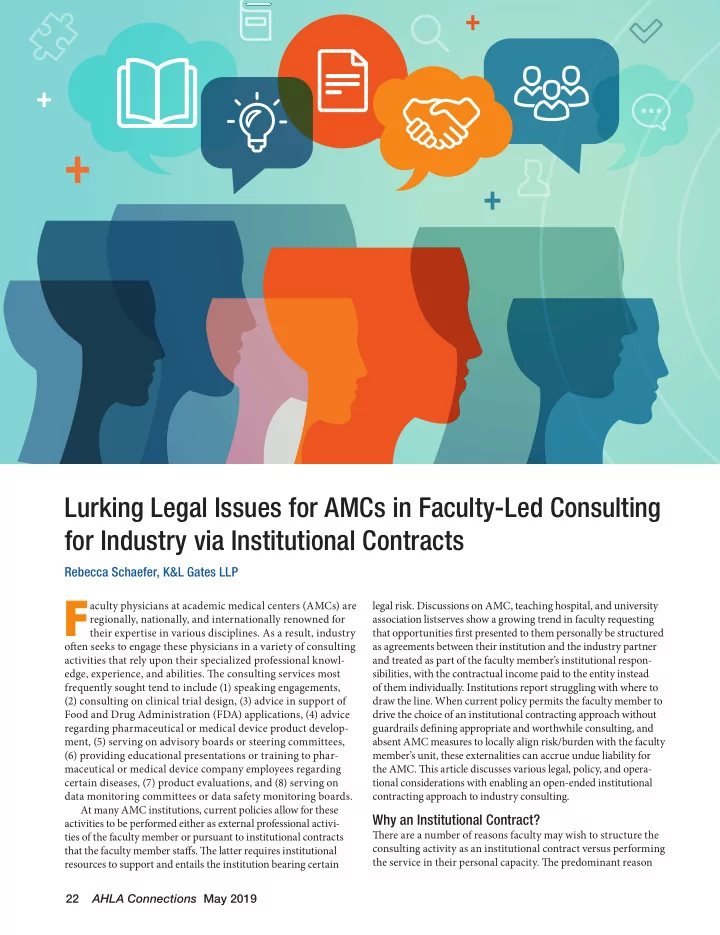

Lurking Legal Issues for AMCs in Faculty-Led Consulting for Industry via Institutional Contracts Rebecca Schaefer, K&L Gates LLP F aculty physicians at academic medical centers (AMCs) are legal risk. Discussions on AMC, teaching hospital, and university regionally, nationally, and internationally renowned for association listserves show a growing trend in faculty requesting their expertise in various disciplines. As a result, industry that opportunities fjrst presented to them personally be structured ofuen seeks to engage these physicians in a variety of consulting as agreements between their institution and the industry partner activities that rely upon their specialized professional knowl- and treated as part of the faculty member’s institutional respon- edge, experience, and abilities. Tie consulting services most sibilities, with the contractual income paid to the entity instead frequently sought tend to include (1) speaking engagements, of them individually. Institutions report struggling with where to (2) consulting on clinical trial design, (3) advice in support of draw the line. When current policy permits the faculty member to Food and Drug Administration (FDA) applications, (4) advice drive the choice of an institutional contracting approach without regarding pharmaceutical or medical device product develop- guardrails defjning appropriate and worthwhile consulting, and ment, (5) serving on advisory boards or steering committees, absent AMC measures to locally align risk/burden with the faculty (6) providing educational presentations or training to phar- member’s unit, these externalities can accrue undue liability for maceutical or medical device company employees regarding the AMC. Tiis article discusses various legal, policy, and opera- certain diseases, (7) product evaluations, and (8) serving on tional considerations with enabling an open-ended institutional data monitoring committees or data safety monitoring boards. contracting approach to industry consulting. At many AMC institutions, current policies allow for these Why an Institutional Contract? activities to be performed either as external professional activi- Tiere are a number of reasons faculty may wish to structure the ties of the faculty member or pursuant to institutional contracts consulting activity as an institutional contract versus performing that the faculty member stafgs. Tie latter requires institutional the service in their personal capacity. Tie predominant reason resources to support and entails the institution bearing certain 22 AHLA Connections May 2019
When current policy permits the faculty member to drive the choice of an institutional contracting approach without guardrails defjning appropriate and worthwhile consulting, and absent AMC measures to locally align risk/ burden with the faculty member’s unit, these externalities can accrue undue liability for the AMC relates to confmict-of-interest (COI) implications if the faculty Directing the compensation to the institution also avoids were to receive payment for the services directly and the notion a personal income tax obligation to the extent the funds are that by being a step removed, the fjnancial payment is not as not passed through as additional compensation. Performing directly attributed to the individual or attribution is avoided the services pursuant to an institutional agreement also avails entirely. Individually receiving payment for personal consulting the faculty member of the institution’s infrastructure support, typically requires disclosure of the fjnancial interest and may, including legal review and negotiation of the contract and depending on the amount, preclude the faculty member under departmental processing of the invoice, thereby obviating the institution’s COI policies from certain roles in AMC research the need for the faculty member to obtain those resources or sponsored by the same industry partner or from serving in advi- perform those functions individually. However, unless the sory roles for national societies or federal research committees institutional contracts include an overhead amount (beyond under the COI policies of those entities. Faculty also may believe the rate the company originally ofgered to the individual that Sunshine Act reporting is avoided if the compensation is faculty), this institutional support may go uncompensated. paid to their institution versus to them personally, though with Lastly, faculty may be interested in limiting personal liability institutional agreements that require a specifjc faculty member’s by substituting the institution as the party in interest respon- performance, applicable manufacturers are still likely to list the sible for adherence to the contract terms and in this approach faculty on the Centers for Medicare & Medicaid Services Open availing her of institutional liability coverage or defenses, as Payments portal as recipients of direct or indirect payments. 1 well as institutional representation, in the event of a dispute. Faculty may fear that being confmicted on an individual Considered from a personal perspective, these are compelling basis or listed on Open Payments will degrade their reputation reasons to want an institutional contract for industry consulting. and ability to be perceived and pursued as key opinion leaders From the AMC’s perspective, limiting an institutional approach in their fjelds. Tie argument continues that this perception and forcing more consulting to personal contracts may decrease will correspondingly impair their institution’s prominence and the overall number of opportunities that faculty deem worth- academic reputation. Similarly, faculty may believe that these while to pursue, thereby limiting the potential for these activities types of consulting activities are consistent with their employ- to bring reputational acclaim to the faculty member (and by ment responsibilities, whether as secondary duties or other- extension the AMC), as well as their potential to foster profes- wise, and that there is an institutional interest in the acclaim sional development and innovation. Further, an institution as these opportunities may garner for their institution, as well as compared to an individual faculty member, may be better posi- the professional development they may afgord. tioned to identify and comply with regulatory and contractual healthlawyers.org 23
Recommend
More recommend